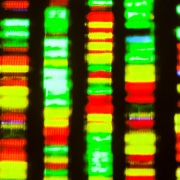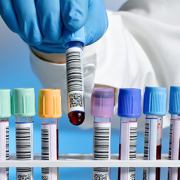Newborn screening: time to expand the list?
Genetic Alliance UK’s newborn screening patient charter sets out why the UK should extend its programme – and establish a pilot for genome sequencing at birth
A recent report from Genetic Alliance UK has called for the UK’s neonatal screening programme to keep pace with other high-income countries, many of which screen for many more conditions in newborns.
Getting an early diagnosis of a rare disease before symptoms begin can help families in numerous ways. For some disorders, starting treatment early in life can dramatically improve outcomes. Even where this is not the case, quality of life can often be improved and families can be alert to symptoms and make future plans.
Current screening
In the UK, parents can consent to have a blood sample taken from their newborn – known as the heel prick test – which is then sent away and tested for conditions that are rare but serious.
In England, Wales and Scotland, nine conditions are screened for; in Northern Ireland it is only five. The UK National Screening Committee makes recommendations every three years about which conditions should be included.
The screening is usually carried out when infants are five days old. Although these tests are highly recommended, parents do not have to have their children screened.
Although the diseases being screened for are genetic in origin, the tests are metabolic, meaning that they are looking for unusual levels of particular chemicals in the blood that indicate that the disease may be present. The screening alone is not diagnostic, and a positive result will indicate that further testing will be needed to confirm a diagnosis.
For example, one of the conditions tested for is phenylketonuria (PKU), which affects around 1 in 10,000 children born. People with PKU cannot break down the amino acid phenylalanine, which is found in many foods. If the disorder is not diagnosed, phenylalanine levels build up within the body while the child is developing, leading to numerous problems including irreversible brain damage. These serious effects can be avoided by a special diet, but this needs to be started in the first few weeks of life.
The blood spot test detects levels of phenylalanine in the blood, not the genetic variant that causes PKU. If high levels are detected, the child can be started on the special diet immediately, while further tests are done to confirm the diagnosis.
Other diseases that are included are sickle cell disease, cystic fibrosis and congenital hypothyroidism, all of which have a genetic cause. You can read more here.
What isn’t screened for?
Many countries in Europe screen for 20 or more conditions, while parents in the US can opt to test for more than 50. Other countries, such as France, screen for fewer conditions than the UK.
“The pace of adoption of new blood spot screening programmes in the UK has become so slow that we have been left behind by the majority of high-income countries,” said Dr Jayne Spink, chief executive of Genetic Alliance UK.
Genetic Alliance wants the list to be expanded to include rare but serious conditions, such as severe combined immune deficiency (SCID) and adrenoleukodystrophy.
Adrenoleukodystrophy affects fewer than 20 babies born each year in the UK, but for them being diagnosed early can “make the difference between life and death”, according to Dr Spink. A build-up of fatty acids in the brain’s white matter causes irreversible progressive loss of mental and physical ability. In some cases, a bone marrow transplant can help, but only in the early stages of the disease, which is why early diagnosis can make such a difference.
The report also points out that a number of further metabolic conditions could be detected using the same tests that are already being run, which would mean they could be adopted without significant extra cost.
Whole genome sequencing at birth?
In addition to expanding the current screening list, the Genetic Alliance report recommends a pilot scheme be established to trial genome sequencing of newborns alongside current screening.
Adding genome sequencing could vastly expand the range of rare and ultra-rare conditions tested, avoiding the ‘diagnostic odyssey’ so often experienced by parents of children with rare diseases.
“We have to ensure that newborn screening keeps pace with diagnosis in later life and we must embrace the potential of both current technology and that of genetics,” said Dr Spink.
The report also outlines the challenges that must be addressed as part of any pilot, including logistical and ethical considerations. Genetic Alliance UK has made the report available for members to review and endorse by Friday 30th August.
–









